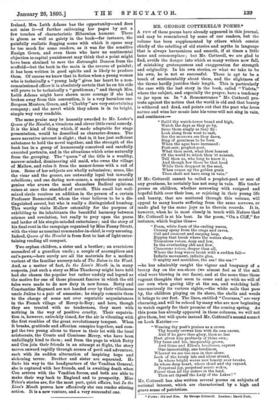MR. GEORGE COTTERELL'S POEMS.* A mEw of these poems have
already appeared in this journal, and may be remembered by some of our readers, but the volume has been supplemented by others which consist chiefly of the retelling of old stories and myths in language that is always harmonious and smooth, if at times a little tame and commonplace ; but Mr. Cotterell, we are glad to find, avoids the danger into which so many writers now fall, of mistaking grotesqueness and exaggeration for strength and originality. In his own stories, or what we take to be his own, he is not so successful. There is apt to be a touch of sentimentality about them, and the slightness of the theme hardly justifies their length. This is particularly the case with the last story in the book, called " Violets," where the subject, and especially the prayer, have a tendency to jar upon us. In "A Remonstrance" Mr. Cotterell pro- tests against the notion that the world is old and that beauty is withered and dead, and points out that the poet who loves nature and wins her music into his verse will not sing in vain, and continues
" Build thy watch-tower broad and high, Watch the days as they go by, Seize them singly as they fly : Look along from west to east, See the morrows ere they dawn, Sing of greatness to be born When the ages have increased: Poet-seer, prophet-poet, What thou seest, what thou hearest Of the world to which thou 'rt nearest, Tell thou us, who long to know it; And though few there be that heed While thou droppest in the seed, When comes up the golden grain Thou shalt not have sung in vain."
If Mr. Cotterell cannot be called a prophet-poet or seer of any greatness, he certainly has not sung in vain. His tender poems on children, whether sorrowing with resigned and hopeful faith over their loss, or rejoicing in their young life and beauty, that are scattered through this volume, will appeal to many hearts suffering from the same sorrows, or made glad by the same joys as he therein records. It is, however, when he is most closely in touch with Nature that Mr. Cotterell is at his best. In the poem, "On a Cliff," for instance, which begins thus-
" Foam, white foam of the curling waves,
Creamy spray from the crags and caves, Coil and crescent and surging leap, Ripples that break where the waters sleep, Tremulous voices, deep and low, In the everlasting ebb and flow, Clamorous voices, deeper than all,
Where the long waves break with a sudden fall—
Infinite movement, infinite glee, 0 mighty and matchless, the sea! the sea!"
—he has admirably caught the vigour and buoyancy of a breezy day on the sea-shore (we almost feel as if the salt wind were blowing in our faces), and at the same time those
vagrant thoughts that seem to come and go with no will of our own when gazing idly at the sea, and watching half- unconsciously its various sights,—the white sails that pass
by, the children playing on its shore, the shells and weeds it brings to our feet. The lines, entitled "Crocuses," are very charming, and will be echoed by many who are now beginning to watch eagerly for their promise of the coming spring. As this poem has already appeared in these columns, we will not give them, but will quote instead Mr. Cotterell's second sonnet on Loch Katrine :—
" Wearing thy poet's praises as a crown
Thy beauty crowns him with its own excess, And if he gave thee glory, thou no less Mist given him profusely of thine own; Thy fame and his, inseparably grown, And thine and Ellen's loveliness, express
One immortality, one loveliness,
Whereof we seo the sum in thee alone.
Loch of the lovely isle and silver strand, In whose bright waves now beauty ever breaks, In whose deep heart, where cloud and sky expand, Perpetual joy, perpetual music wakes, Fairer than all thy sisters in the land, Thou art thyself the Lady of the Lakes ! "
Mr. Cotterell has also written several poems on subjects of national interest, which are characterised by a high and
grave sense of patriotism.
• Exins ; Old and New. By George CotterelL London: David Nutt.


















































 Previous page
Previous page